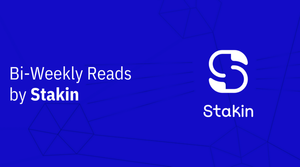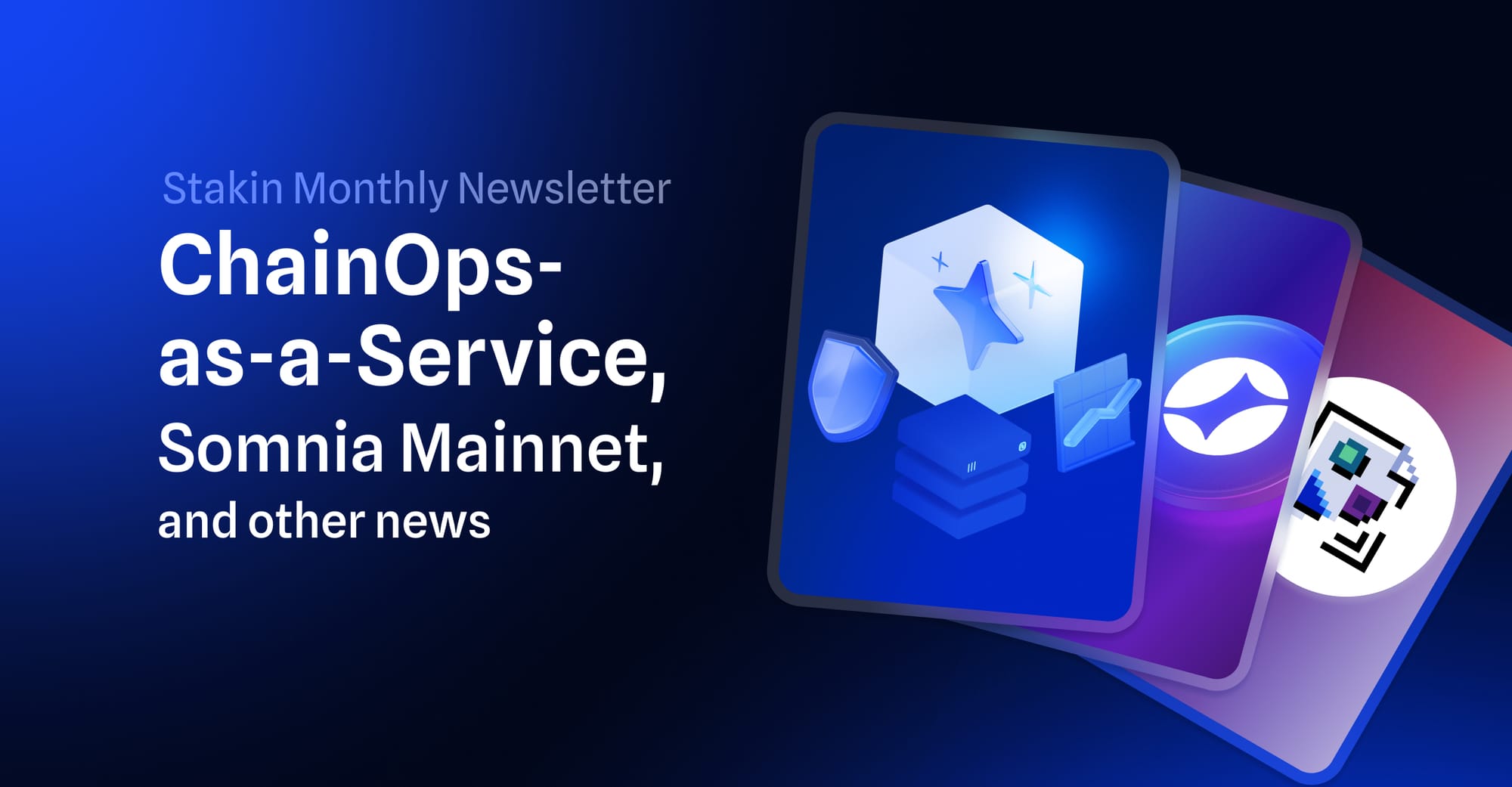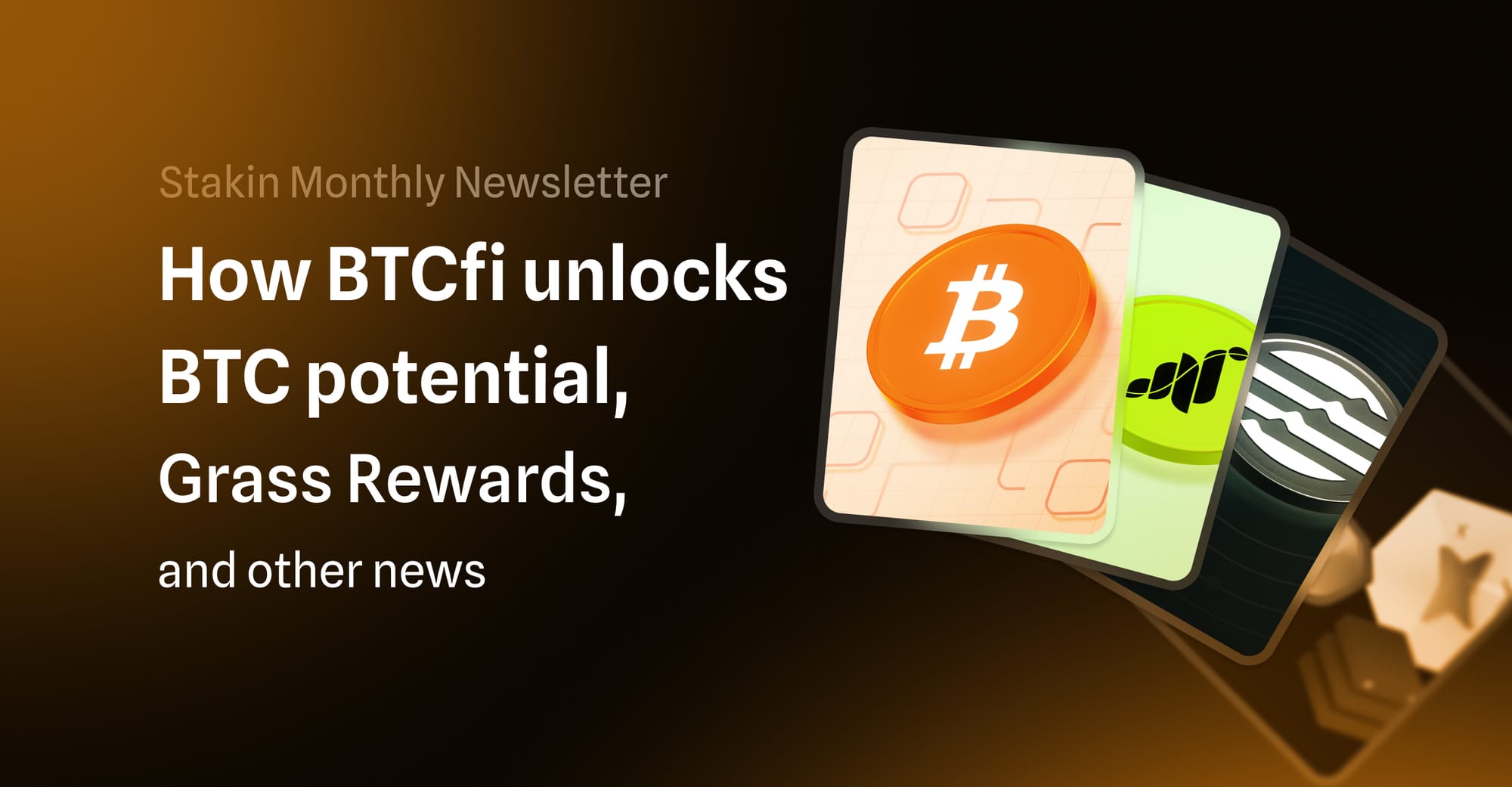POS Bakerz becomes Stakin
A bit more than a year has passed since the beginning of our staking adventure. During that time, we’ve grown from a small Tezos bakery to a leading multi-asset staking provider. That growth made us realize something that the mission and focus of our company had grown as well. So we’re proud to announce our rebranding as Stakin, where the future holds new networks, new communities, and a wide variety of services. Stakin is re-establishing its commitment to all of the blockchains that we have endorsed throughout the year, such as Tezos, Cosmos, and Icon. We will continue to support these blockchains and ecosystems by providing a reliable infrastructure.
Here are some of the new developments:
- We will expand our services to welcome new networks and communities.
- We will introduce our Staking Lottery, for which we recently received a grant from Velic Financial.
Stay tuned for more developments through our Twitter, Telegram, or Website.
We thank the 2,000+ delegators worldwide who have put their trust in us and have chosen us as their validator. We are excited to look to the future and help you build and support the networks in which you believe.
For more information about the re-branding, click here.
🧑🚀 ICON P-Rep Meetings & IISS 3.0
On April 4th, the ICON P-Rep Community Meeting took place. Click here for the recording made by Rhizome ICX. Below is a quick recap of all the things discussed.
- CONSENSUS is virtual now, what plans do the team involved have?
- The IISS 3.0 is out, what are the impressions, what modifications should be implemented etc.
On the subject matter of CONSENSUS, the community meeting came out with the following. First, the teams will await further information from CoinDesk on this year’s virtual CONSENSUS. Secondly, a concrete plan needs to be put in place relating to sponsorship issues and participation. And last but not least, expand and incorporate more teams.
The IISS 3.0 impressions were good; however, there, of course, is room for a lot of improvement. Most teams agreed that P-Reps should have “skin in the game” and contribute to the ICON network. Moreover, some teams are not in support of the current bond requirements, and others expressed that CPF rates may be too high. Another aspect discussed was that the CPF could be too centralized with ICON and connecting enterprises having enough votes to veto CPF requests.
The fundamental changes for IISS 3.0 are:
- Bond Requirement: All P-Reps will be required to stake a bond equivalent to 5% of the delegation received to maximize rewards.
- Bonded Delegation: Bonded Delegation = Bond posted / 5%. Rank, rewards, and governance power are all based on Bonded Delegation
- Bonded Delegation Percent = Bonded Delegation / Total Votes on the network x 100
- Remove the B1 Reward
- B2 = i_rep
- I_rep reset to keep inflation constant at the time of deployment.
- Creation of the Contribution Proposal Fund (“CPF”) managed by P-Reps
- Bonded Delegation percent of above 1% will be raised to the ¾ power before calculating rewards.
- The difference between linear calculation and root calculation will be sent to the CPF.
- 10% of all inflation for P-Reps will be sent to the CPF.
- Slashing: 10% of the bond will be slashed for missing a Network Proposal Vote.
- Slashing: 10% of the bond will be slashed for missing a CPF vote.
- Slashing: All slashing penalties going forward will come from the bond, not from the voter.
- Optionality to stop receiving the additional delegation.
🥳 Celo Launched!
On April 22nd, Earth Day, the Celo Mainnet has launched.
The Celo Platform is developed based on the idea of building a monetary system that creates the conditions of prosperity for everyone. The platform is accessible on a mobile phone. CLabs, the team behind the Celo Platform, aims to promote prosperity by making sure human basic needs are met around the world. And by enabling financial growth potential for everyone. Furthermore, they want to increase social support for people worldwide.
The first release of the Mainnet, called RC1, went live on April 22nd, 2020. Here’s the roadmap, of what will happen in the next days to come:
- ✅ 16:00 UTC — Genesis Block Creation — April 22nd, 2020. At the same time, core contracts will be developed, and if the quorum is achieved, block production will begin.
- ✅ At the end of April 2020, the governance proposals for the unfreezing of validation elections and epoch awards should be submitted. When they pass, they will be implemented at the beginning of May 2020. Halfway through May, it is expected to have another two governance proposals submitted.
- ✅ If all goes well, on the 13th of May, 2020. The migration to the mainnet will be completed🎉
For more information about the Celo Network, check our in-depth article here.
💰 E-Money Protocol
After over three years of hard work, the E-Money Protocol launched at the end of March 2020. According to its founders, the first block was produced on March 25th, 2020, at 12:00 UTC. The 40 validator slots have been filled, and the community is looking forward to a new quarter.
The protocol has issued their first EUR, CHF, SEK, NOK, and DKK tokens last week. On April 1st, the NGM token presale closed, with successful results. Furthermore, the following long and short term developments have been announced:
- An IBC integration with the Cosmos Hub and the network will participate in the Game of Zones.
- Using WebAssembly CosmWasm, they will support on-chain trading algorithms on the DEX.
- They will create more integrations with the retail payment space.
- The new currencies, such as GBP, JPY, and USD, will be added.
For a more in-depth article on the E-Money Protocol, you can click here.
🎈 NEW! Feature of KAVA on the Big Dipper
The Big Dipper and KAVA gave us all a sneak peek of the DeFi platform that will allow you to manage your assets securely with a ledger. It will make it able to collateralize your BNB and earn fees in USDX more safely and securely. The BNB Testnet launch was successful, and KAVA is now looking forward to the mainnet launch. Check the sneak peek here.
🕵️♂️ Coda Testnet Launch
Built by O (1) Labs, Coda is a new cryptocurrency protocol focussed mainly on reducing the size of the blockchain from many gigabytes to the size of a few kilobytes. It is expected that the small size and, therefore, accessibility of this protocol might take it places other currencies aren’t able to go. This new cryptocurrency can process thousands of transactions per second, and no matter how many transactions have happened, the entire historical data of the chain will be small enough to be stored on your smartphone.
Testnet launch release 3.2 (“Bugspray”) is arriving on April 20th. For this phase of the testnet, unfortunately, only 200 spots are available due to some technical constraints (“temporary trade-off”). Those 200 members will get the opportunity to stake, complete technical challenges, and increase their chances to become eligible for the Genesis token program. For more information, check out the article here.
🕹 Game of Zones
It’s only a couple more days until the launch of Game of Zones by Cosmos. Registering is only possible until today, 11:59 pm PST. If you want to participate, click here.
Last year, the Cosmos Network hosted the first adversarial testnet to prepare network operators for the launch of the BTF network. This time, the team that created Game of Stakes is back with Game of Zones.
What will be happening? From its launch date on, there will be three separate, week-long stages with different Capture-the-Flag style goals. Additionally, to complete the objectives, teams will need to keep a persistent connection by sending at least one packet per connection (per 60 minutes) to be eligible to win.
- 👉 Game of Zones will launch on Friday, May 1st, 2020.
👩💻 For more information, check our Twitter, Telegram, Medium Page, or Website.
DISCLAIMER: This is not financial advice. Staking and cryptocurrencies investment involves a high degree of risk, and there is always the possibility of loss, including the loss of all staked digital assets. Additionally, delegators are at risk of slashing in case of security or liveness faults on some PoS protocols. We advise you to DYOR before choosing a validator.



